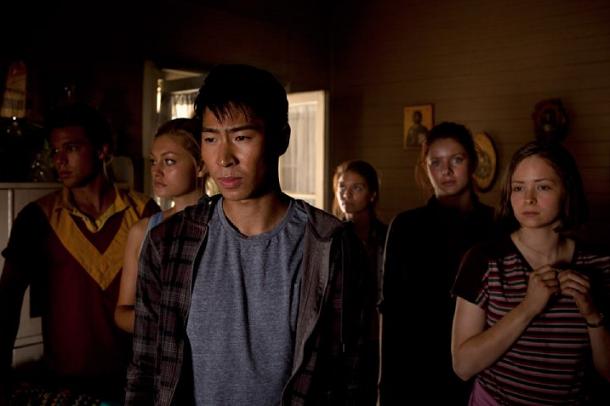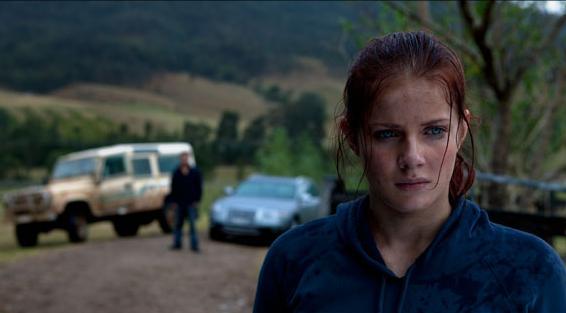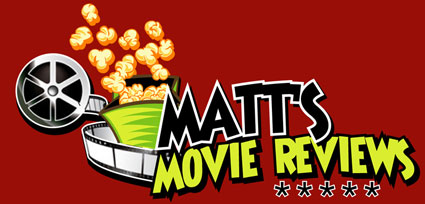A teen girl sits alone, her head stuck in a copy of Miles Franklin’s classic novel My Brilliant Career.
“How is it?” her friend asks.
“Better than the movie”, she replies.
Smiling, her friend says sheepishly: “Yeah. Books usually are”.
It is a moment taken from Tomorrow, When the War Began, the anticipated film based on the first of John Marsden’s acclaimed novels, which revolves around a group of high school students who fight back when their country is invaded by a foreign force, and it serves as both a cheeky joke and stern reminder that adapting a much loved novel is tricky business.
Yet for long time screenwriter turned first time director Stuart Beattie, the chance to turn a much loved novel into a feature film was an exciting opportunity, regardless of the weight of expectation placed on it.
“The fact that Tomorrow... is a recognised title in (Australia) was just icing on the cake. I loved the story, I loved the characters, I thought that it would make a great movie, it was offered to me and so I pounced on it.”
And so began the process of bringing the war of tomorrow into the cinemas of today.
AUSSIE ADAPTATION
Tomorrow, When the War Began is a rarity in Australian cinema: a big budget genre movie, based on a well known title, that can compete against Hollywood exports at the local box office.
Yet while our most famous international hits are film like Mad Max and Wolf Creek, the genre movie continues to be kept from a distance with many a filmmaker opting for bleak drama rather than a shoot ‘em up.
“I think we don’t see many stories like this because they don’t exist” explained Beattie. “There are a very few properties like Tomorrow... that are Australian, and the money is not there to make those films. Perhaps someone could write a big, blockbuster, epic, Australian story, and make people go “Whoa, we love it!” But we don’t have the money to make it (laughs).”
“You’ve got to remember that Mad Max was shot on a shoestring because the story allowed for that. You have a post apocalyptic world, the desert, a couple of cars, and that’s all you need. A film like this is more inside civilisation, so you need streets, and an invading army, and all of that kind of thing. So it was a story that demanded a certain budget. There was no way to pull it off any other way.”
And who better to “pull it off” than Beattie, who for the last decade wrote scripts for acclaimed blockbusters like Collateral and Pirates of the Caribbean: Curse of the Black Pearl, bringing years of Hollywood experience to his Australian directorial debut.
“I always wanted to direct, which is why I got into writing. It was just getting to a point where I felt like I was ready, that I could handle that job. And also just looking for the right thing.”
“What I was looking for had to be Australian, it had to be commercial and fun, and it had to be a great story with terrific characters. On top of that it also had this title that everybody knew, which was something that you do in Hollywood all the time. In fact that’s all you do, you buy the viewfinder title and you make the viewfinder movie.”
I wondered, having worked for the likes of Michael Mann and Baz Luhrmann, did he ever seek advice from these master filmmakers?
“Oh, God yeah! First thing I did was call every director I knew (laughs). I think I must have called about 40 or 50 different directors, real world class guys who were really kind and returned emails, or phone calls, or whatever it was. Just gave me all of these great little hints that you would never get anywhere else, from no film school, no teacher...you just get it from guys who have been working for 30 years on sets. Just great stuff.”
 |
| “It’s that whole thing of what do you do when your homes are taken away from you? When is it ok to kill? When is it not? That’s a big part of the book and to me that’s interesting stuff to talk about." - Stuart Beattie |
TEEN SOLDIERS
Casting characters near and dear to the hearts of readers can make or break a film adaptation of a popular book. The Bonfire of the Vanities is a case in point (failure). Interview with the Vampire, another (success).
With Marsden’s characters so close to the fans of his readers, Beattie made an effort to cast his film right.
“I didn’t really know any young Australian actors, having lived in Hollywood for the last 20 years”, explained Beattie. “The first thing I did was to just go on the internet and find photos of young Australians, whether they were actors or models. I didn’t know who they are, they were just photos.”
“I would find a photo and would say in my mind ‘That’s how the character should look!’ So that was the starting point. I did that for all eight characters, and then that kind of let my casting director know what I was looking for, and then we went from there.”
One of those cast was Rachel Hurd-Wood. She plays Corrie McKenzie, best friend and rock to the teen troops’ leader Ellie (Caitlin Stasey).
Ironically, Hurd-Wood first came across the novel while starring in an adaptation of another story novel, in Australia no less.
“I was in Australia doing Peter Pan when I was 12, so I read the books because they were a part of tutoring”, explained Hurd-Wood. “I’m not sure if I would have come across them otherwise, so I was very fortunate to know of them through that.”
Since her debut, Hurd-Wood stared in various period pieces such as Perfume and Dorian Gray. With Tomorrow... , she got to rough it up a bit, while putting on an impeccable Australian accent which left no trace of the actor who many critics dub the “English rose”, and it was an opportunity she relished.
“I’m not built for sport, but I really do enjoy the adrenaline of doing all of that kind of stuff. I love riding on a dirt bike. That was so cool! So I really did enjoy that side of it. Before Tomorrow...I’ve only ever done period things where I’m in a corset, playing the victim. So it was quite good to do something more kick arse.”
To reach that level, much preparation had to be achieved beforehand.
“I had to learn the accent, for one. We did dirt bike training. We did personal training sessions together, so we were all fit and stuff, so we could run around and all that. And a lot of character work with Stuart and the other cast members.”
In the process a bond developed between the cast, which is still strong today.
“That was what made the experience, becoming really good friends with the gang. It was amazing to have such great friends off set as well, because for me personally with what I’ve done and being young as well, it has always been the adults who I worked with, and then you go back to your family.”
“With this I was out here on my own, and my social group were the people I was working with. So it was fortunate for me that they were my age, and amazingly cool people.”
 |
| “I would like to think that I would react the same as Corrie, and do everything that I could do to defend myself, my friends, and my country.” - Rachel Hurd-Wood |
JUST WAR
A point of debate in Marsden’s novels was the identity of the invaders, since they never had one. Marsden explained that the reason for it being so was that he didn’t want his work to be used as a political or racial tool.
Now with his words turned into visuals, it was a controversial mystery which Beattie had to confront.
The result was what many expected: an enemy of Asian origin, most certainly China, due to the star insignia on their helmets.
Yet Beattie contends that is not so cut and dry.
“Well, they’re not from China” asserted Beattie. “We never say where they’re from. It was a very conscious decision not to say who it is, because the story is not about who’s invading Australia, it’s about these characters and what happens to them when their homes are taken away from them.”
“I didn’t want to make a film which was like ‘Look out! They’re coming.’ I didn’t want to make a scare film, kind of thing. I wanted to make an emotionally gripping, rollercoaster, fun film. So I just wanted to stay out of the politics as much as possible. I didn’t want to give ammunition to anyone with their own political out there to latch on to us. So it just seemed like the smart thing to do. John did it, and he had good reasons for it, so I thought that was smart and let’s just keep it like that.”
“So the vaguely Asian thing was what we ended up with. We were very careful it wasn’t just any one nation. And the language they speak is all gobilly-goo, different languages played backwards and everything. We worked very hard to make sure it’s not racist, and it’s not saying...they’re just the antagonistic force, which should provide the drama in the story. Sort of like the shark in Jaws, or the aliens in Independence Day. They’re the things out there that are creating the situation which these characters end up caught up in. It’s about the characters first.”
How the characters react gives Tomorrow... a moral and emotional weight, in their declaration of Just War against an invading enemy.
Such is the power of Marsden’s novel and Beattie’s adaptation, that it confronts the viewer to look inside themself and ask: What would you do?
“The dilemma of what would you do in that situation...you’ve got that scene where they are sitting around and discussing “Are you in?” Each character has a bit to say about it, and I think it’s interesting in the different viewpoints”, explained Hurd-Wood. “I would like to think that I would react the same as Corrie, and do everything that I could do to defend myself, my friends, and my country.”
Continued Beattie: “It’s that whole thing of what do you do when your homes are taken away from you? When is it ok to kill? When is it not? That’s a big part of the book and to me that’s interesting stuff to talk about. Is it ok to kill? Is it not ok to kill? When do we sanction it? When do we not? There are so many double standards out there in the world, so all that stuff is pretty interesting to me. The value of human life is very interesting to me. “
“So it was important that we kept that from the book, and that the characters did put a lot of value in every human life, even the ones they took, and that they struggled with this notion. Should we be doing this? It’s not just that concrete that we are going to go to war. There is a great, sound, rationale argument for just hiding. There is a great, rational argument for just giving yourself up. So what are we gonna do? What’s the answer? ”
The film takes those moral implications one step further, by referencing the plight of the Aboriginal people during England’s colonisation of Australia.
Explains Beattie: “Well it’s not really mentioned in the book. But I felt it was important to bring it up in the film that this was the second invasion of Australia (laughs). That’s why that scene in the alley, where Ellie spots this mural on the wall, I didn’t want to make the film about that. It’s obviously a whole different film about a whole different subject. But I did want to acknowledge it and say that, yes I’m aware of that, and I wanted to tip off our characters that the shoe is on the other foot now, and maybe they can see their own history in a whole new light now.”
DEAD OF THE NIGHT & BEYOND
Tomorrow... is based on the first of nine books. With the possibility of sequels, it had to be asked: has there been any talk on adapting the next novel in the series, The Dead of Night?
“You can’t help but wonder, but the second you start really writing down things, or investing your soul, you’re just setting yourself up for disappointment. Because the question of sequels is completely out of my hands, out of the company’s hands, and completely in the hands of the audience, whether they come or not.”
Surprisingly, the notion of “film franchise” is foreign to the Australian film industry. Yet the possibility of a continuing saga, born and bred in Australia is an appealing one for Beattie, and no doubt for the fans of his movie.
“It’s been a while (laughs). Mad Max was certainly the last good action franchise we had...we had the Crocodile Dundeefranchise...but yeah, I would love to change that.”
Tomorrow, When the War Began is currently playing in cinemas through Paramount Pictures. |

